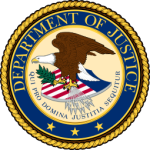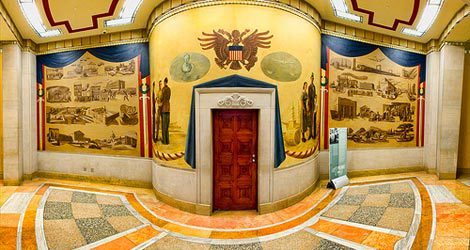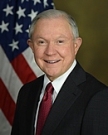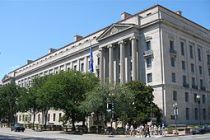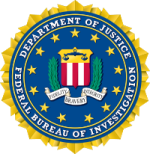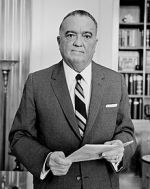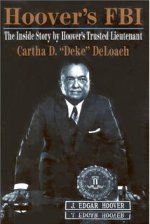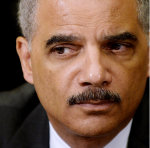U.S. Code Title 28 - Judiciary and Judicial Procedure
28 U.S. Code Part II - DEPARTMENT OF JUSTICE (§§ 501 to 599B)
United States Department of Justice
Wikipedia
The United States Department of Justice (DOJ), also known as the Justice Department, is a federal executive department of the U.S. government, responsible for the enforcement of the law and administration of justice in the United States, equivalent to the justice or interior ministries of other countries.
The Department is headed by the Attorney General of the United States, who is nominated by the President and confirmed by the Senate and is a member of the Cabinet. The current Attorney General is Loretta Lynch. Read more
.
Jeff Sessions U.S. Attorney General
Confirmation; DOJ Message; Wikipedia
- Department of Justice
- House Judiciary Committee
- Office of Government Ethics
- Office of Legal Counsel
- Office of Professional Responsibility
- Senate Judiciary Committee
Jeff Sessions was sworn in as the 84th Attorney General of the United States on February 9, 2017 by Michael R. Pence. President Donald J. Trump announced his intention to nominate Mr. Sessions on November 18, 2016.
Prior to becoming Attorney General, Mr. Sessions served as a United States Senator for Alabama since 1996. As a United States Senator, he focused his energies on maintaining a strong military, upholding the rule of law, limiting the role of government, and providing tax relief to stimulate economic growth and to empower Americans to keep more of their hard-earned money. Read more
28 U.S.C. Chapter 31 - THE ATTORNEY GENERAL
28 U.S.C. § 503 - Attorney General
The President shall appoint, by and with the advice and consent of the Senate, an Attorney General of the United States. The Attorney General is the head of the Department of Justice.
U.S. Code Title 28 - Judiciary and Judicial Procedure
U.S. Code Title 28 - JUDICIARY AND JUDICIAL PROCEDURE
PART I - ORGANIZATION OF COURTS (§§ 1 to 482)
PART II - DEPARTMENT OF JUSTICE (§§ 501 to 599B)
PART III - COURT OFFICERS AND EMPLOYEES (§§ 601 to 998)
PART IV - JURISDICTION AND VENUE (§§ 1251 to 1631)
PART V - PROCEDURE (§§ 1651 to 2113)
PART VI - PARTICULAR PROCEEDINGS (§§ 2201 to 5001)
Below: The Robert F. Kennedy Building in August 2006. The building serves as the headquarters of the U.S. Department of Justice.
DOJ "About" page
The Judiciary Act of 1789, ch. 20, sec. 35, 1 Stat. 73, 92-93 (1789) created the Office of the Attorney General. Originally a one-person part-time position, the Attorney General was to be "learned in the law" with the duty "to prosecute and conduct all suits in the Supreme Court in which the United States shall be concerned, and to give his advice and opinion upon questions of law when required by the President of the United States, or when requested by the heads of any of the departments, touching any matters that may concern their departments." The workload quickly became too much for one person, necessitating the hiring of several assistants for the Attorney General. With an increasing amount of work to be done, private attorneys were retained to work on cases.
In 1870, after the post-Civil War increase in the amount of litigation involving the United States necessitated the very expensive retention of a large number of private attorneys to handle the workload, a concerned Congress passed the Act to Establish the Department of Justice, ch. 150, 16 Stat. 162 (1870) setting it up as "an executive department of the government of the United States" with the Attorney General as its head. Officially coming into existence on July 1, 1870, the Department of Justice, pursuant to the 1870 Act, was to handle the legal business of the United States. The Act gave the Department control over all criminal prosecutions and civil suits in which the United States had an interest. In addition, the Act gave the Attorney General and the Department control over federal law enforcement. To assist the Attorney General, the 1870 Act created the Office of the Solicitor General.
The 1870 Act is the foundation upon which the Department of Justice still rests. However, the structure of the Department of Justice has changed over the years, with the addition of the Deputy Attorneys General and the formation of the Divisions. Unchanged is the steadily increasing workload of the Department. It has become the world's largest law office and the central agency for enforcement of federal laws. Read more
__________________________________________________________________
U.S. DEPARTMENT OF JUSTICE OVERVIEW PDF File 15 pages
fy13-bud-summary-request-performance.pdf
Adobe Acrobat document [263.1 KB]
U.S. Code Title 28 - JUDICIARY AND JUDICIAL PROCEDURE
28 U.S. Code PART I - ORGANIZATION OF COURTS (§§ 1 to 482)
CHAPTER 1 - Supreme Court (§§ 1 to 6)
CHAPTER 3 - Courts of Appeals (§§ 41 to 49)
CHAPTER 5 - District Courts (§§ 81 to 144)
CHAPTER 6 - Bankruptcy Judges (§§ 151 to
159)
CHAPTER 7 - United States Court of Federal
Claims
(§§ 171 to 180)
CHAPTER 9 - [Repealed] (§ 211)
CHAPTER 11 - Court of International Trade (§§ 251 to
258)
CHAPTER 13 - Assignment of Judges to Other Courts
(§§ 291-297)
CHAPTER 15 - Conferences and Councils of Judges
(§§ 331 to 335)
CHAPTER 16 - Complaints Against Judges and Judicial Discipline
(§§ 351 to 364)
CHAPTER 17 - Resignation and Retirement of Justices and Judges
(§§ 371 to 377)
CHAPTER 19 - Distribution of Reports and Digests (§§ 411 to
415)
CHAPTER 21 - General Provisions Applicable to Courts &
Judges
(§§ 451 to 463)
CHAPTER 23 - Civil Justice Expense and Delay Reduction Plans
(§§ 471 to 482)
28 U.S. Code Part II - DEPARTMENT OF JUSTICE (§§ 501 to 599B)
CHAPTER 31 - The Attorney General (§§ 501 to
530D)
CHAPTER 33 - Federal Bureau of Investigation (§§
531 to 540C)
CHAPTER 35 - United States Attorneys
(§§ 541 to 550)
CHAPTER 37 - United States Marshals
Service (§§ 561 to 575)
CHAPTER 39 - United States Trustees
(§§ 581 to 589b)
CHAPTER 40 - Independent Counsel
(§§ 591 to 599)
CHAPTER 40A - Bureau of Alcohol, Tobacco, Firearms,
and
Explosives (§§ 599A to 599B)
28 U.S.C. Chapter 31 - THE ATTORNEY GENERAL
28 U.S.C. § 503 - Attorney General
The President shall appoint, by and with the advice and consent of the Senate, an Attorney General of the United States. The Attorney General is the head of the Department of Justice.
28 U.S.C. Chapter 33 - FEDERAL BUREAU OF INVESTIGATION
28 U.S.C. § 531 - Federal Bureau of Investigation.
The Federal Bureau of Investigation is in the Department of Justice.
U.S. Code PART III - COURT OFFICERS AND EMPLOYEES
(§§ 601 to 998)
CHAPTER 41 - Administrative Office U.S. Courts (§§ 601 to
613)
CHAPTER 42 - Federal Judicial Center (§§ 620 to
629)
CHAPTER 43 - United States Magistrate Judges (§§ 631 to
639)
CHAPTER 44 - Alternative Dispute Resolution (§§ 651 to
658)
CHAPTER 45 - Supreme Court (§§ 671 to 677)
CHAPTER 47 - Courts of Appeals (§§ 711 to 715)
CHAPTER 49 - District Courts (§§ 751 to 756)
CHAPTER 50 - Omitted]
CHAPTER 51 - U.S. Court of Federal Claims (§§ 791 to
798)
CHAPTER 53 - Repealed] (§ 831)
CHAPTER 55 - Court of International Trade (§§ 871 to
873)
CHAPTER 57 - General Provisions Applicable to Court
Officers
and Employees (§§ 951 to 963)
CHAPTER 58 - U.S. Sentencing Commission (§§ 991 to 998)
U.S. Code PART IV - JURISDICTION AND VENUE
(§§ 1251 to 1631)
CHAPTER 81 - Supreme Court (§§ 1251 to
1260)
CHAPTER 83 - Courts of Appeal (§§ 1291 to 1296)
CHAPTER 85 - District Courts; Jurisdiction (§§ 1330 to
1369)
CHAPTER 87 - District Courts; Venue (§§ 1390 to
1413)
CHAPTER 89 - District Courts; Removal of Cases From
State
Courts (§§ 1441 to
1455)
CHAPTER 90 - Omitted]
CHAPTER 91 - United States Court of Federal Claims
(§§ 1491 to 1509)
CHAPTER 93 - Repealed] (§
1541)
CHAPTER 95 - Court of International Trade (§§ 1581 to
1585)
CHAPTER 97 - Jurisdictional Immunities of Foreign
States
(§§ 1602 to 1611)
CHAPTER 99 - General Provisions (§ 1631)
U.S. Code PART V - PROCEDURE (§§ 1651 to 2113)
CHAPTER 111 - General Provisions (§§ 1651 to
1659)
CHAPTER 113 - Process (§§ 1691 to 1697)
CHAPTER 114 - Class Actions (§§ 1711 to 1715)
CHAPTER 115 - Evidence; Documentary (§§ 1731 to
1746)
CHAPTER 117 - Evidence; Depositions (§§ 1781 to
1785)
CHAPTER 119 - Evidence; Witnesses (§§ 1821 to
1828)
CHAPTER 121 - Juries; Trial by Jury (§§ 1861 to
1878)
CHAPTER 123 - Fees and Costs (§§ 1911 to 1932)
CHAPTER 125 - Pending Actions and Judgments (§§ 1961 to
1964)
CHAPTER 127 - Executions and Judicial Sales (§§ 2001 to
2007)
CHAPTER 129 - Moneys Paid Into Court (§§ 2041 to
2045)
CHAPTER 131 - Rules of Courts (§§ 2071 to 2077)
CHAPTER 133 - Review - Miscellaneous Provisions
(§§ 2101 to 2113)
U.S. Code PART VI - PARTICULAR PROCEEDINGS
(§§ 2201 to 5001)
CHAPTER 151 - Declaratory Judgments (§§ 2201 to
2202)
CHAPTER 153 - Habeas Corpus (§§ 2241 to 2256)
CHAPTER 154 - Special Habeas Corpus Procedures In
Capital
Cases (§§
2261 to 2266)
CHAPTER 155 - Injunctions; Three-Judge Courts
(§§ 2281 to
2284)
CHAPTER 157 - Surface Transportation Board
Orders;
Enforcement and Review (§§ 2321 to 2324)
CHAPTER 158 - Orders of Federal Agencies; Review
(§§ 2341 to
2353)
CHAPTER 159 - Interpleader (§ 2361)
CHAPTER 161 - United States as a Party Generally
(§§ 2401 to
2416)
CHAPTER 163 - Fines, Penalties and Forfeitures
(§§ 2461 to
2467)
CHAPTER 165 - United States Court of Federal Claims
Procedure
(§§ 2501 to
2522)
CHAPTER 167 - Repealed] (§ 2601)
CHAPTER 169 - Court of International Trade
Procedure
(§§ 2631 to
2647)
CHAPTER 171 - Tort Claims Procedure (§§ 2671 to
2680)
CHAPTER 173 - Attachments in Postal Suits (§§ 2710 to
2718)
CHAPTER 175 - Repealed] (§ 2901)
CHAPTER 176 - Federal Debt Collection Procedure
(§§ 3001 to
3308)
CHAPTER 178 - Professional and Amateur Sports
Protection
(§§ 3701 to
3704)
CHAPTER 179 - Judicial Review of Certain Actions by
Presidential
Offices (§§ 3901 to 3908)
CHAPTER 180 - Assumption of Certain Contractual
Obligations
(§ 4001)
CHAPTER 181 - Foreign Judgments (§§ 4101 to
4105)
CHAPTER 190 - Miscellaneous (§ 5001)
28 U.S.C. Part II - DEPARTMENT OF JUSTICE
28 U.S.C. § 531 - Federal Bureau of Investigation.
The Federal Bureau of Investigation is in the Department of Justice.
Federal Bureau of Investigation
Wikipedia
The Federal Bureau of Investigation (FBI) is the domestic intelligence and security service of the United States, which simultaneously serves as the nation's prime Federal law enforcement organization. Operating under the jurisdiction of the U.S. Department of Justice, FBI is concurrently a member of the U.S. Intelligence Community and reports to both the Attorney General and the Director of National Intelligence.[2] A leading U.S. counterterrorism, counterintelligence, and criminal investigative organization, FBI has jurisdiction over violations of more than 200 categories of Federal crimes.[3].
Although many of FBI's functions are unique, its activities in support of national security are comparable to that of the British MI5 and the Russian FSB. Unlike the Central Intelligence Agency (CIA), which has no law enforcement authority and is focused on intelligence collection overseas, FBI is primarily a domestic agency, maintaining 56 field offices in major cities throughout the United States, and more than 400 resident agencies in lesser cities and areas across the nation. At an FBI field office, a senior-level FBI officer concurrently serves as the representative of the Director of National Intelligence (DNI).[4][5]
Despite its domestic focus, the FBI also maintains a significant international footprint, operating 60 Legal Attache (LEGAT) offices and 15 sub-offices in U.S. embassies and consulates across the globe. These overseas offices exist primarily for the purpose of coordination with foreign security services and do not usually conduct unilateral operations in the host countries.[6] It is of note that the FBI can and does at times carry out secret activities overseas,[7] just as the CIA has a limited domestic function; these activities generally require coordination across government agencies.
FBI was established in 1908 as the Bureau of Investigation (BOI). Its name was changed to the Federal Bureau of Investigation (FBI) in 1935. The FBI headquarters is the J. Edgar Hoover Building, located in Washington, D.C. Read more
Wikipedia
John Edgar Hoover (January 1, 1895 -- May 2, 1972) was the first Director of the Federal Bureau of Investigation (FBI) of the United States. Appointed director of the Bureau of Investigation—predecessor to the FBI—in 1924, he was instrumental in founding the FBI in 1935, where he remained director until his death in 1972 at age 77. Hoover is credited with building the FBI into a larger crime-fighting agency, and with instituting a number of modernizations to police technology, such as a centralized fingerprint file and forensic laboratories. Read more
C-Span2 Booknotes interview by Brian Lamb of Cartha D. "Deke" DeLoach
Mr. DeLoach, a former FBI Deputy Director under J. Edgar Hoover, talked about his recently published book, Hoover's FBI, published by Regnery. It focuses on the FBI during the controversial tenure of J. Edgar Hoover. It attempts to disprove the many allegations against Mr. Hoover, including his sexual behavior and secret files.
FBI History - John Edgar Hoover
FBI Director, May 10, 1924 - May 2, 1972
FBI News - Remembering ‘Deke’ DeLoach
Trusted Adviser to J. Edgar Hoover Dies at 92
Eric Holder's parting shot: It's too hard to bring civil rights cases.
- Department of Justice
- House Judiciary Committee
- Office of Government Ethics
- Office of Legal Counsel
- Office of Professional Responsibility
- Senate Judiciary Committee
Instead Holder helped grant an unjust pardon to Marc Rich. See, How Eric Holder Facilitated the Most Unjust Presidential Pardon in American History, by Justin Peters, Slate's Crime blog.
UPDATE: Revisiting Eric Holder's parting shot:
It's too hard to bring civil rights cases.
Eric Holder's parting shot: It's too hard to bring civil rights cases, reported by politico.com, sounds absurd on its face because he was the Attorney General of the United States.
But when considered with the fact that many or most criminal civil rights violations are perpetrated under color of law (FBI), Holder's parting shot begins to make sense, as in the failure of the government to bring a civil rights case against David R. Ellspermann, Clerk and Comptroller of Marion County. Its too hard to bring civil rights cases because the government is so corrupt. Color of law (DOJ) cases are obstructed in many ways by corrupt federal judges, corrupt federal magistrates, corrupt AUSA’s and corrupt law enforcement. Also, the criminal justice system lacks a safe harbor to report obstruction of justice in color of law cases.
The American Bar Association and the NAACP issued a joint statement on Racial Bias in the Criminal Justice System, July 2015.
"The growing skepticism about the integrity of the criminal justice system is driven by real and perceived evidence of racial bias among some representatives of that system."
This is especially true in the Middle District of Florida, home of active support by "representatives of that system" for white supremacy racism, Lost Cause of the Confederacy, membership in the KKK, and its history of racial terror lynching.
Eric Holder wants lower bar for civil-ri[...]
Adobe Acrobat document [78.1 KB]
Marc Rich, most unjust pardon in America[...]
Adobe Acrobat document [108.4 KB]
Mismanagement at the Civil Rights Division of the U.S. Department of Justice
Hearing
Before The Committee On the Judiciary
HOUSE OF REPRESENTATIVES
One Hundredth Thirteenth Congress
First Session, April 16, 2013, Serial No.
113–10
Bob Goodlatte, Chairman of the House Judiciary Committee made this opening statement at a hearing on a House Judiciary Committee hearing on "Mismanagement at the Civil Rights Division of the Department of Justice."

